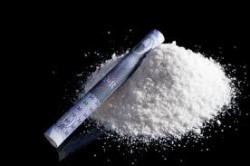
Common types of amphetamines abused are those legally prescribed to treat attention deficit disorders such as ADD and ADHD, narcolepsy, and obesity and the illegally manufactured methamphetamine that is wreaking havoc on communities and families nationwide.
These stimulant drugs speed up the brain and bodily processes to increase energy, alertness, awareness, heart rate, and blood pressure while causing euphoria and other adverse effects in high amounts. Any of them can cause significant physical health problems if they are abused and more often, lead to addiction and mental health disorders that are difficult to overcome.
Amphetamine Abuse

Amphetamine abuse often occurs through crushing or snorting the drug.
Legitimate use of amphetamines as prescribed and for those intended can be very helpful, but, taking higher dosages, more often, diverting them to others, or abusing them in alternative ways is considered amphetamine abuse. According to the National Institute on Drug Abuse, because amphetamines “suppress appetite, increase wakefulness, and increase focus and attention, they are frequently abused for purposes of weight loss or performance enhancement (e.g., to help study or boost grades in school;”
Amphetamines are generally prescribed to be taken orally, although abuse commonly leads to intravenous injection, crushing and snorting, or smoking which intensifies the effects and increases the potential for harm.
15 Warning Signs of Amphetamine Abuse
The following, are 15 warning signs of amphetamine abuse that can be used to recognize the need for help where early intervention can save the person’s life.
- Running out of medications early.
- Protecting their supply – frequently counting the pills or hiding them in several different places.
- Overly anxious for the next dose.
- Unrealistic ideas of personal power and ability, overly energetic.
- Loss of social inhibitions.
- Unusual sleep patterns – staying up for longer than normal periods with a “crash” pattern or excessive sleep afterwards.
- Unexplainable mood swings – happy and upbeat one day and depressed, dysphoric, or solemn the next.
- Aggressive, violent, or hostile tendencies that appear out of nowhere and out of norm for the individual.
- Physical exhaustion from poor diet, sleep habits, and physical impairments caused by the amphetamine abuse or the unhealthy behaviors associated with it.
- Isolation from family and friends or loss of interest in important activities.
- Changing associations to hang out with others who are abusing amphetamines.
- Dark thought patterns or ideations of suicide.
- Inability to focus or decreased cognition and memory.
- Amphetamine-caused psychosis including hallucinations, paranoia, or schizophrenic like behaviors.
- Altered sexual behaviors.


